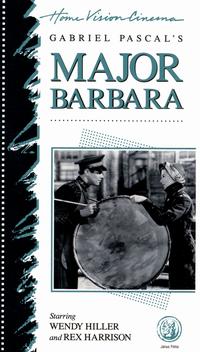| Major Barbara | |
|---|---|
 | |
| Directed by | Gabriel Pascal Uncredited: Harold French David Lean |
| Written by | George Bernard Shaw Marjorie Deans Anatole de Grunwald |
| Produced by | Gabriel Pascal |
| Starring | Wendy Hiller Rex Harrison Robert Morley Robert Newton |
| Cinematography | Ronald Neame Uncredited: Freddie Young |
| Edited by | David Lean Charles Frend |
| Music by | William Walton |
Production company | Gabriel Pascal Productions |
| Distributed by | General Film Distributors |
Release date |
|
Running time | 131 minutes |
| Country | United Kingdom |
| Language | English |
| Budget | £230,000 [1] or $800,000 [2] |
Major Barbara is a 1941 British film starring Wendy Hiller and Rex Harrison. The film was produced and directed by Gabriel Pascal and edited by David Lean. It was adapted for the screen by Marjorie Deans and Anatole de Grunwald, based on the 1905 stage play Major Barbara by George Bernard Shaw. It was both a critical and a financial success. [3]